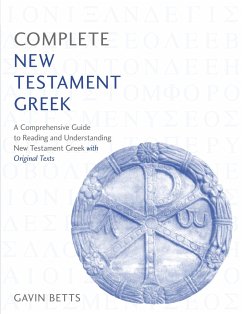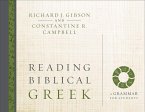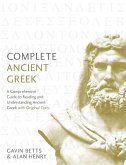Gavin Betts
Complete New Testament Greek
Learn to Read, Write and Understand New Testament Greek with Teach Yourself
Gavin Betts
Complete New Testament Greek
Learn to Read, Write and Understand New Testament Greek with Teach Yourself
- Box
- Merkliste
- Auf die Merkliste
- Bewerten Bewerten
- Teilen
- Produkt teilen
- Produkterinnerung
- Produkterinnerung
Carefully structured units teach Greek from the New Testament right from the start, and topics of interest for New Testament studies are introduced as appropriate. This new edition makes learning fast and hassle-free, with an easy-to-read page design and extra exercises provided online.
Andere Kunden interessierten sich auch für
![Reading Biblical Greek Reading Biblical Greek]() Richard J. GibsonReading Biblical Greek31,99 €
Richard J. GibsonReading Biblical Greek31,99 €![Complete Ancient Greek Complete Ancient Greek]() Gavin BettsComplete Ancient Greek53,99 €
Gavin BettsComplete Ancient Greek53,99 €![Greek Greek]() Hardy HansenGreek65,99 €
Hardy HansenGreek65,99 €![A Greek Reader A Greek Reader]() Mark JeongA Greek Reader15,99 €
Mark JeongA Greek Reader15,99 €![A Reader in Biblical Greek A Reader in Biblical Greek]() Richard a WrightA Reader in Biblical Greek27,99 €
Richard a WrightA Reader in Biblical Greek27,99 €![A Grammar of New Testament Greek A Grammar of New Testament Greek]() Rodney A WhitacreA Grammar of New Testament Greek49,99 €
Rodney A WhitacreA Grammar of New Testament Greek49,99 €![Questions and Rhetoric in the Greek New Testament Questions and Rhetoric in the Greek New Testament]() Douglas EstesQuestions and Rhetoric in the Greek New Testament44,99 €
Douglas EstesQuestions and Rhetoric in the Greek New Testament44,99 €-
-
-
Carefully structured units teach Greek from the New Testament right from the start, and topics of interest for New Testament studies are introduced as appropriate. This new edition makes learning fast and hassle-free, with an easy-to-read page design and extra exercises provided online.
Hinweis: Dieser Artikel kann nur an eine deutsche Lieferadresse ausgeliefert werden.
Hinweis: Dieser Artikel kann nur an eine deutsche Lieferadresse ausgeliefert werden.
Produktdetails
- Produktdetails
- Verlag: John Murray Press
- Seitenzahl: 288
- Erscheinungstermin: 7. August 2018
- Englisch
- Abmessung: 244mm x 188mm x 18mm
- Gewicht: 592g
- ISBN-13: 9781473627895
- ISBN-10: 1473627893
- Artikelnr.: 48094477
- Herstellerkennzeichnung
- Libri GmbH
- Europaallee 1
- 36244 Bad Hersfeld
- gpsr@libri.de
- Verlag: John Murray Press
- Seitenzahl: 288
- Erscheinungstermin: 7. August 2018
- Englisch
- Abmessung: 244mm x 188mm x 18mm
- Gewicht: 592g
- ISBN-13: 9781473627895
- ISBN-10: 1473627893
- Artikelnr.: 48094477
- Herstellerkennzeichnung
- Libri GmbH
- Europaallee 1
- 36244 Bad Hersfeld
- gpsr@libri.de
Gavin Betts (retired) was Associated Professor of Classical Studies, Monash University, Victoria, Australia. His publications include Teach Yourself Latin, Teach YourselfNew Testament Greek, Teach YourselfNew Testament Greek and various translations of medieval and Modern Greek texts.
1. : Introduction 2. : How to use this book 3. : Glossary of grammatical terms 4. : Abbreviations 5. * : Unit 1: 1.1
1 The Greek alphabet and its pronunciation
2 Accents .2 Exercise * : Unit 2: 2.1
1 Nouns in Greek
2 Second declension and the masculine and neuter definite article
3 Basic uses of cases
4 Verbs in Greek
5 Present and future indicative active
6 Word order and elision .2 Greek reading
1 Vocabulary .3 The nature o * : Unit 3: 3.1
1 First declension (feminine nouns) and the feminine definite article
2 First declension (masculine nouns)
3 First and second declension adjectives
4 Adverbs
5 Prepositions
6 Present indicative and infinitive of 'I am' .2 Greek read * : Unit 4: 4.1
1 Imperfect indicative active and weak aorist indicative and infinitive active
2 Personal pronouns
3 Non-Greek proper nouns
4 Connecting particles .2 Greek reading
1 Vocabulary .3 Excursus—Books in antiquity * : Unit 5: 5.1
l Third declension—consonant stem nouns (1)
2 Contracted verbs
3 Further uses of the definite article .2 Greek reading
1 Vocabulary * : Unit 6: 6.1
1 Third declension—consonant stem nouns (2)
2 'know'
3 Compound verbs formed with prepositional prefixes
4 stems in palatals, labials, dentals .2 Greek reading
1 Vocabulary * : Unit 7: 7.1
1 Strong aorist indicative and infinitive active
2 Direct and indirect speech
3 'say' and direct speech
4 Indirect command
5 Numerals
6 Phrases expressing time and space .2 Greek reading
1 Vocabulary * : Unit 8: 8.1
1 Middle and passive voices
2 Deponent verbs
3 Negatives
4 Indirect statement
5 Third declension nouns—stems .2 Greek reading
1 Vocabulary .3 Excursus—How the New Testament has been transmitted * : Unit 9: 9.1
1 Demonstrative pronouns
2 A relative pronoun and adjectival clauses
3 Reflexive and reciprocal pronouns
4 Possessive adjectives and pronouns .2 Greek reading
1 Vocabulary * : Unit 10: 10.1
1 Questions, direct and indirect
2 First and third declension adjectives
3 Third declension adjectives .2 Greek reading * : Unit 11: 11.1
1 Aorist passive, root aorist and future passive
2 Agent and instrument
3 Crasis .2 Greek reading * : Unit 12: 12.1
1 Participles
2 Uses of participles .2 Greek reading .3 Excursus—The text of the New Testament * : Unit 13: 13.1
1 Moods of the Greek verb
2 Subjunctive mood
3 Uses of the subjunctive (1)
3 Optative mood and its uses .2 Greek reading * : Unit 14: 14.1
1 Uses of the subjunctive (2)
2 Perfect indicative active .2 Greek reading * : Unit 15: 15.1
1 Verbs used with the genitive or dative
2 Further particles 2 Greek reading * : Unit 16: 16.1
1 Pluperfect indicative active
3 Perfect and pluperfect indicative middle
passive
4 Other parts of the perfect tense .2 Greek reading * : Unit 17: 17.1
1 Imperative mood - commands and prohibitions
2 Comparison of adjectives and adverbs
3 Meaning of the comparative and superlative
4 Constructions involving the comparative .2 Greek reading .3 Excursus—The Septuagint * : Unit 18: 18.1
1 'give', 'put', 'place'
3 Conditional sentences
4 Other potential constructions .2 Greek reading * : Unit 19: 19.1
1 Eccentric verbs .2 Greek reading * : Unit 20: 20.1
1 Uses of cases (1) - nominative and accusative
3 Uses of cases (2) - genitive
4 Oddities in verbs .2 Greek reading .3 Excursus—Translations of the New Testament * : Unit 21: 21.1
1 Uses of cases (3) - dative
2 First and second declension contracted adjectives
3 Further demonstrative and relative adjectives
pronouns .2 Greek reading 6. : Suggestions for further study 7. : Appendices 8. * : 1 Conjugation of 'loosen' * : 2 Conjugation of contracted verbs (present and imperfect) * : 3 Conjugation of 'be', 'say', 'know' * : 4 Root aorists * : 5 Conjugation of 'give', 'put', 'place', 'make stand' * : 6 Numerals * : 7 Accentuation 9. : Key to exercises 10. : Principal parts of verbs 11. : Vocabulary 12. : Index
1 The Greek alphabet and its pronunciation
2 Accents .2 Exercise * : Unit 2: 2.1
1 Nouns in Greek
2 Second declension and the masculine and neuter definite article
3 Basic uses of cases
4 Verbs in Greek
5 Present and future indicative active
6 Word order and elision .2 Greek reading
1 Vocabulary .3 The nature o * : Unit 3: 3.1
1 First declension (feminine nouns) and the feminine definite article
2 First declension (masculine nouns)
3 First and second declension adjectives
4 Adverbs
5 Prepositions
6 Present indicative and infinitive of 'I am' .2 Greek read * : Unit 4: 4.1
1 Imperfect indicative active and weak aorist indicative and infinitive active
2 Personal pronouns
3 Non-Greek proper nouns
4 Connecting particles .2 Greek reading
1 Vocabulary .3 Excursus—Books in antiquity * : Unit 5: 5.1
l Third declension—consonant stem nouns (1)
2 Contracted verbs
3 Further uses of the definite article .2 Greek reading
1 Vocabulary * : Unit 6: 6.1
1 Third declension—consonant stem nouns (2)
2 'know'
3 Compound verbs formed with prepositional prefixes
4 stems in palatals, labials, dentals .2 Greek reading
1 Vocabulary * : Unit 7: 7.1
1 Strong aorist indicative and infinitive active
2 Direct and indirect speech
3 'say' and direct speech
4 Indirect command
5 Numerals
6 Phrases expressing time and space .2 Greek reading
1 Vocabulary * : Unit 8: 8.1
1 Middle and passive voices
2 Deponent verbs
3 Negatives
4 Indirect statement
5 Third declension nouns—stems .2 Greek reading
1 Vocabulary .3 Excursus—How the New Testament has been transmitted * : Unit 9: 9.1
1 Demonstrative pronouns
2 A relative pronoun and adjectival clauses
3 Reflexive and reciprocal pronouns
4 Possessive adjectives and pronouns .2 Greek reading
1 Vocabulary * : Unit 10: 10.1
1 Questions, direct and indirect
2 First and third declension adjectives
3 Third declension adjectives .2 Greek reading * : Unit 11: 11.1
1 Aorist passive, root aorist and future passive
2 Agent and instrument
3 Crasis .2 Greek reading * : Unit 12: 12.1
1 Participles
2 Uses of participles .2 Greek reading .3 Excursus—The text of the New Testament * : Unit 13: 13.1
1 Moods of the Greek verb
2 Subjunctive mood
3 Uses of the subjunctive (1)
3 Optative mood and its uses .2 Greek reading * : Unit 14: 14.1
1 Uses of the subjunctive (2)
2 Perfect indicative active .2 Greek reading * : Unit 15: 15.1
1 Verbs used with the genitive or dative
2 Further particles 2 Greek reading * : Unit 16: 16.1
1 Pluperfect indicative active
3 Perfect and pluperfect indicative middle
passive
4 Other parts of the perfect tense .2 Greek reading * : Unit 17: 17.1
1 Imperative mood - commands and prohibitions
2 Comparison of adjectives and adverbs
3 Meaning of the comparative and superlative
4 Constructions involving the comparative .2 Greek reading .3 Excursus—The Septuagint * : Unit 18: 18.1
1 'give', 'put', 'place'
3 Conditional sentences
4 Other potential constructions .2 Greek reading * : Unit 19: 19.1
1 Eccentric verbs .2 Greek reading * : Unit 20: 20.1
1 Uses of cases (1) - nominative and accusative
3 Uses of cases (2) - genitive
4 Oddities in verbs .2 Greek reading .3 Excursus—Translations of the New Testament * : Unit 21: 21.1
1 Uses of cases (3) - dative
2 First and second declension contracted adjectives
3 Further demonstrative and relative adjectives
pronouns .2 Greek reading 6. : Suggestions for further study 7. : Appendices 8. * : 1 Conjugation of 'loosen' * : 2 Conjugation of contracted verbs (present and imperfect) * : 3 Conjugation of 'be', 'say', 'know' * : 4 Root aorists * : 5 Conjugation of 'give', 'put', 'place', 'make stand' * : 6 Numerals * : 7 Accentuation 9. : Key to exercises 10. : Principal parts of verbs 11. : Vocabulary 12. : Index
1. : Introduction 2. : How to use this book 3. : Glossary of grammatical terms 4. : Abbreviations 5. * : Unit 1: 1.1
1 The Greek alphabet and its pronunciation
2 Accents .2 Exercise * : Unit 2: 2.1
1 Nouns in Greek
2 Second declension and the masculine and neuter definite article
3 Basic uses of cases
4 Verbs in Greek
5 Present and future indicative active
6 Word order and elision .2 Greek reading
1 Vocabulary .3 The nature o * : Unit 3: 3.1
1 First declension (feminine nouns) and the feminine definite article
2 First declension (masculine nouns)
3 First and second declension adjectives
4 Adverbs
5 Prepositions
6 Present indicative and infinitive of 'I am' .2 Greek read * : Unit 4: 4.1
1 Imperfect indicative active and weak aorist indicative and infinitive active
2 Personal pronouns
3 Non-Greek proper nouns
4 Connecting particles .2 Greek reading
1 Vocabulary .3 Excursus—Books in antiquity * : Unit 5: 5.1
l Third declension—consonant stem nouns (1)
2 Contracted verbs
3 Further uses of the definite article .2 Greek reading
1 Vocabulary * : Unit 6: 6.1
1 Third declension—consonant stem nouns (2)
2 'know'
3 Compound verbs formed with prepositional prefixes
4 stems in palatals, labials, dentals .2 Greek reading
1 Vocabulary * : Unit 7: 7.1
1 Strong aorist indicative and infinitive active
2 Direct and indirect speech
3 'say' and direct speech
4 Indirect command
5 Numerals
6 Phrases expressing time and space .2 Greek reading
1 Vocabulary * : Unit 8: 8.1
1 Middle and passive voices
2 Deponent verbs
3 Negatives
4 Indirect statement
5 Third declension nouns—stems .2 Greek reading
1 Vocabulary .3 Excursus—How the New Testament has been transmitted * : Unit 9: 9.1
1 Demonstrative pronouns
2 A relative pronoun and adjectival clauses
3 Reflexive and reciprocal pronouns
4 Possessive adjectives and pronouns .2 Greek reading
1 Vocabulary * : Unit 10: 10.1
1 Questions, direct and indirect
2 First and third declension adjectives
3 Third declension adjectives .2 Greek reading * : Unit 11: 11.1
1 Aorist passive, root aorist and future passive
2 Agent and instrument
3 Crasis .2 Greek reading * : Unit 12: 12.1
1 Participles
2 Uses of participles .2 Greek reading .3 Excursus—The text of the New Testament * : Unit 13: 13.1
1 Moods of the Greek verb
2 Subjunctive mood
3 Uses of the subjunctive (1)
3 Optative mood and its uses .2 Greek reading * : Unit 14: 14.1
1 Uses of the subjunctive (2)
2 Perfect indicative active .2 Greek reading * : Unit 15: 15.1
1 Verbs used with the genitive or dative
2 Further particles 2 Greek reading * : Unit 16: 16.1
1 Pluperfect indicative active
3 Perfect and pluperfect indicative middle
passive
4 Other parts of the perfect tense .2 Greek reading * : Unit 17: 17.1
1 Imperative mood - commands and prohibitions
2 Comparison of adjectives and adverbs
3 Meaning of the comparative and superlative
4 Constructions involving the comparative .2 Greek reading .3 Excursus—The Septuagint * : Unit 18: 18.1
1 'give', 'put', 'place'
3 Conditional sentences
4 Other potential constructions .2 Greek reading * : Unit 19: 19.1
1 Eccentric verbs .2 Greek reading * : Unit 20: 20.1
1 Uses of cases (1) - nominative and accusative
3 Uses of cases (2) - genitive
4 Oddities in verbs .2 Greek reading .3 Excursus—Translations of the New Testament * : Unit 21: 21.1
1 Uses of cases (3) - dative
2 First and second declension contracted adjectives
3 Further demonstrative and relative adjectives
pronouns .2 Greek reading 6. : Suggestions for further study 7. : Appendices 8. * : 1 Conjugation of 'loosen' * : 2 Conjugation of contracted verbs (present and imperfect) * : 3 Conjugation of 'be', 'say', 'know' * : 4 Root aorists * : 5 Conjugation of 'give', 'put', 'place', 'make stand' * : 6 Numerals * : 7 Accentuation 9. : Key to exercises 10. : Principal parts of verbs 11. : Vocabulary 12. : Index
1 The Greek alphabet and its pronunciation
2 Accents .2 Exercise * : Unit 2: 2.1
1 Nouns in Greek
2 Second declension and the masculine and neuter definite article
3 Basic uses of cases
4 Verbs in Greek
5 Present and future indicative active
6 Word order and elision .2 Greek reading
1 Vocabulary .3 The nature o * : Unit 3: 3.1
1 First declension (feminine nouns) and the feminine definite article
2 First declension (masculine nouns)
3 First and second declension adjectives
4 Adverbs
5 Prepositions
6 Present indicative and infinitive of 'I am' .2 Greek read * : Unit 4: 4.1
1 Imperfect indicative active and weak aorist indicative and infinitive active
2 Personal pronouns
3 Non-Greek proper nouns
4 Connecting particles .2 Greek reading
1 Vocabulary .3 Excursus—Books in antiquity * : Unit 5: 5.1
l Third declension—consonant stem nouns (1)
2 Contracted verbs
3 Further uses of the definite article .2 Greek reading
1 Vocabulary * : Unit 6: 6.1
1 Third declension—consonant stem nouns (2)
2 'know'
3 Compound verbs formed with prepositional prefixes
4 stems in palatals, labials, dentals .2 Greek reading
1 Vocabulary * : Unit 7: 7.1
1 Strong aorist indicative and infinitive active
2 Direct and indirect speech
3 'say' and direct speech
4 Indirect command
5 Numerals
6 Phrases expressing time and space .2 Greek reading
1 Vocabulary * : Unit 8: 8.1
1 Middle and passive voices
2 Deponent verbs
3 Negatives
4 Indirect statement
5 Third declension nouns—stems .2 Greek reading
1 Vocabulary .3 Excursus—How the New Testament has been transmitted * : Unit 9: 9.1
1 Demonstrative pronouns
2 A relative pronoun and adjectival clauses
3 Reflexive and reciprocal pronouns
4 Possessive adjectives and pronouns .2 Greek reading
1 Vocabulary * : Unit 10: 10.1
1 Questions, direct and indirect
2 First and third declension adjectives
3 Third declension adjectives .2 Greek reading * : Unit 11: 11.1
1 Aorist passive, root aorist and future passive
2 Agent and instrument
3 Crasis .2 Greek reading * : Unit 12: 12.1
1 Participles
2 Uses of participles .2 Greek reading .3 Excursus—The text of the New Testament * : Unit 13: 13.1
1 Moods of the Greek verb
2 Subjunctive mood
3 Uses of the subjunctive (1)
3 Optative mood and its uses .2 Greek reading * : Unit 14: 14.1
1 Uses of the subjunctive (2)
2 Perfect indicative active .2 Greek reading * : Unit 15: 15.1
1 Verbs used with the genitive or dative
2 Further particles 2 Greek reading * : Unit 16: 16.1
1 Pluperfect indicative active
3 Perfect and pluperfect indicative middle
passive
4 Other parts of the perfect tense .2 Greek reading * : Unit 17: 17.1
1 Imperative mood - commands and prohibitions
2 Comparison of adjectives and adverbs
3 Meaning of the comparative and superlative
4 Constructions involving the comparative .2 Greek reading .3 Excursus—The Septuagint * : Unit 18: 18.1
1 'give', 'put', 'place'
3 Conditional sentences
4 Other potential constructions .2 Greek reading * : Unit 19: 19.1
1 Eccentric verbs .2 Greek reading * : Unit 20: 20.1
1 Uses of cases (1) - nominative and accusative
3 Uses of cases (2) - genitive
4 Oddities in verbs .2 Greek reading .3 Excursus—Translations of the New Testament * : Unit 21: 21.1
1 Uses of cases (3) - dative
2 First and second declension contracted adjectives
3 Further demonstrative and relative adjectives
pronouns .2 Greek reading 6. : Suggestions for further study 7. : Appendices 8. * : 1 Conjugation of 'loosen' * : 2 Conjugation of contracted verbs (present and imperfect) * : 3 Conjugation of 'be', 'say', 'know' * : 4 Root aorists * : 5 Conjugation of 'give', 'put', 'place', 'make stand' * : 6 Numerals * : 7 Accentuation 9. : Key to exercises 10. : Principal parts of verbs 11. : Vocabulary 12. : Index








